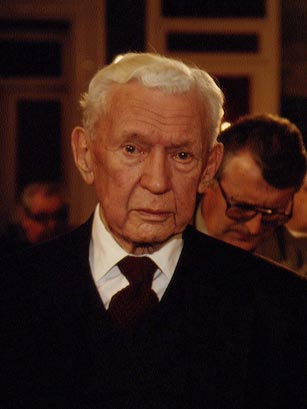
Maurice Couve de Murville attends a parliamentary majority session in April 1994
First Person
After the war there was the general feeling that we must not have Continental wars every 20 years, especially between France and Germany. We felt we needed a general agreement among Europeans. That is how the idea came about of creating an organization that would make a new war impossible.
Foreign Minister Robert Schuman considered it indispensable that France and Germany work together. That was the impetus for the Schuman Plan, which was the beginning of European construction. When he returned to power, De Gaulle worked actively to bring about reconciliation with Germany. The Franco-German Treaty of 1963 was the symbolic incarnation of reconciliation and the desire for an entente between France and Germany. I was very much a partisan of this reconciliation.
But it was the cold war that was the defining phenomenon of the epoch. De Gaulle found it absurd. He sought to establish direct relations between France and the U.S.S.R. That led to his trip to Russia in 1966, where he was very well received. That trip changed things. From that point on, Russia had another interlocutor-France-and the others, Germany, Britain, later opened up to Russia to some extent. But by and large the European partners were afraid it would displease the U.S. if they opened direct dialogue with Russia. Anything that raised fears that America would no longer be absolute masters of the situation was frowned on by Washington and most Europeans.
De Gaulle's approach was good for France, because it led to a renewal of our national spirit. The whole question is this: Are all our responsibilities in the international arena going to be based on the U.S., or will the other countries conserve their personal responsibility and have their own policies? The other Europeans were entirely indifferent to this question.
Another big turning point was the independence of Algeria. This was extremely revolutionary. It was accepted by the French, but not easily. If De Gaulle had not been in power, it would not have been accepted in such a short time. Algerian independence also had international implications because it liberated us, giving us a free hand to act elsewhere. If the war had continued, the accord with the Germans would have had less effect. But once the Algerian war ended in 1962, French foreign policy was freer than before. It was not a coincidence that the German treaty was signed one year later, in 1963.
Former ambassador Maurice Couve de Murville served as France's Foreign Minister from 1958 to 1968